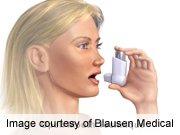
MONDAY, April 30 (HealthDay News) — Health risks from ground-level ozone pollution spike between March and October, lung specialists at Ben Taub General Hospital in Houston have found.
Ozone can cause severe breathing attacks, including intense chest pains and trouble breathing. Most at risk are children who spend a lot of time outdoors, seniors and people with asthma or other respiratory problems.
“If inhaled, ozone causes breathing and airway problems for asthma sufferers and smokers with chronic obstructive pulmonary disease,” Dr. Nick Hanania, director of the hospital’s Adult Asthma Clinic and Pulmonary Diagnostic Laboratory, which is part of the Harris County Hospital District, said in a district news release. “For some sufferers, immediate hospital attention and treatment are required.”
Some other signs of exposure to ground ozone include:
- Coughing and throat irritation
- Trouble breathing
- Inflammation of the lining of the lungs
- Chronic lung infections
Not to be confused with the layer of ozone high in the atmosphere that protects Earth from the sun’s harmful rays, ground-level ozone pollution can be dangerous, Hanania explained. It is created when pollution from cars and industrial sites combines with intense heat, and its hazy, foggy shimmer can be seen from miles away.
In order to reduce exposure to ground ozone, the lung specialists recommended the following precautions when ozone levels are high:
- Stay indoors except during the early morning or after sunset.
- Don’t exercise or work outside when the U.S. Environmental Protection Agency reports that ozone levels are high.
- Avoid congested or high-traffic areas.
- To prevent pulling ozone indoors, do not place fans in windows. Instead close windows and opt for air conditioning.
“Public ozone alerts are important because they help people stay safe and healthy,” said Hanania, who also is an associate professor of pulmonary, critical care and sleep medicine at Baylor College of Medicine in Houston. “Depending on the levels of ozone in the air, these alerts can be life-saving for some people. The best thing is to be in a place with air conditioning.”
Hanania said anyone experiencing trouble breathing should seek immediate medical attention.
More information
The U.S. Environmental Protection Agency provides more information on ground level ozone.

